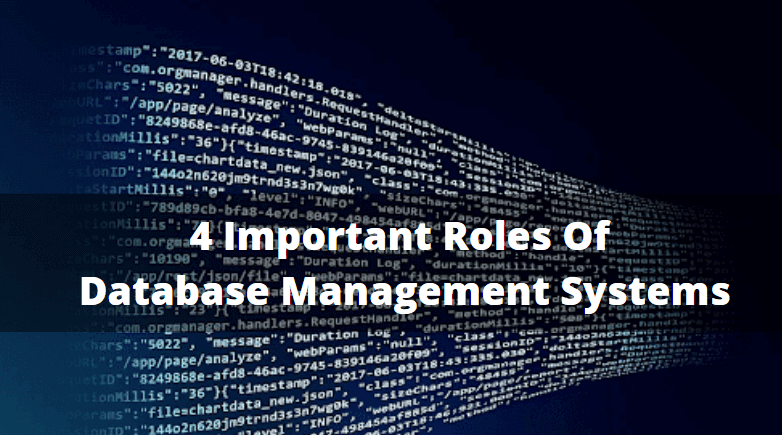In this article, we are going to learn 4 Important Roles Of Database Management Systems. Many industries exist today, and not all businesses are operating at the enterprise level. Collateral industry components may have a reduced need for data management. Primarily, though, industrial exploits produce massive datasets that can be quite daunting. Finding a simple statistic is akin to finding a needle in a haystack without database management.

Follow the below Article For 4 Important Roles Of Database Management Systems:
Different schools of thought exist here, different industries will have different needs. Manufacturing is a different industry than mining; both have heavy machinery involved in production on a daily basis, though, and there could be database management software that works in either scenario.
Generally, certain aspects of data management will apply across most industries. Particularly, this writing will cover four key roles as information management systems play for almost all businesses in the modern industry.
- Information Consolidation And Management
Say you run ten factories in five states. Say each factory has a hundred employees. Say each employee generates fifty megabytes of data a day through clock-in, clock-out, and activities on your network. Say each factory has fifty machines enabled with the Internet of Things (IoT) devices, and those also produce fifty megabytes a day. That’s 7500 MB per facility, per day.
For ten facilities, that’s 75 gigabytes a day, approximately. You’re producing 27,375 terabytes a year of information. That’s quite a bit of information! To navigate such huge data sets requires information management systems you can rely on. Here’s the kicker: the average digital user produces .77 gigabytes of data a day—that’s well over 700 megabytes.
If your employees produce even half that on a daily basis internally, then the opening illustration has exponentially under-represented the situation. Making use of all that information requires consolidation. Database management systems do that for you.
- Security In Terms Of Backup And Compartmentalization
Database management systems make it easier to backup specific portions of data. Sometimes you don’t want to backup the entire “image” of your network at once, as this will take too long. You may have some data that’s more important than the totality of produced information, and that’s what you want to prioritize securing.
Database management software helps you manage your data specifically. You can employ things like automated backup, and you can more effectively secure all information produced. Through management software, it’s possible to compartmentalize information.
Compartmentalization can allow you to additionally “quarantine” certain areas of a network should a virus be identified. If you don’t have database management software in place, it can be hard to identify specific areas of operations where you’re being compromised in situations like that.
- Facilitation Of Data Availability, Visibility, And Utilization
Data is more available through database management solutions. You can simply enter a query and find the data you need. Certain software options will do this better than others. In terms of visibility, availability, and utilization, it’s very important to have systems in place to manage your data. This is especially true in industry, where unexpected needs can develop.
If you’re operating an industrial operation on an international scale, overseas operations could benefit from the data you produce. Say you’re implementing some new production protocol, and how effective this protocol is in your business will determine whether the company transfers that protocol to other businesses. Database management systems would enable this tactic.
- Lubrication Of IT Infrastructure Directly And Collaterally
IT infrastructure on an industrial scale has a high propensity to get stopped up from all sorts of things. Laws, politics, economy, accidents, upper management issues—there are a lot of things that can clog up a production floor, or otherwise cause an incident. Think of database management solutions as oil for the engine of your industrial operation. It’s digital lubrication.
Finding An Effective Database Management System
There are a lot of things to consider when it comes to industrial production. Finding the right database management solution is something that’s definitely near the top of the list. What good is IT if you can’t put it to productive use?
For some additional information on this issue, here’s an article designed to help you further narrow down varying aspects of database management systems to make an informed choice. Without such solutions, you’ll decrease security, have less smooth overall operations, and limit the visibility, availability, and utility of data. For most industries, database management software is absolutely fundamental.
Also Read – How to Install MySQL 8.0 in Ubuntu Linux
That’s all, In this article, we have explained 4 Important Roles Of Database Management Systems. I hope you enjoy this article. If you like this article, then just share it. If you have any questions about this article, please comment.
